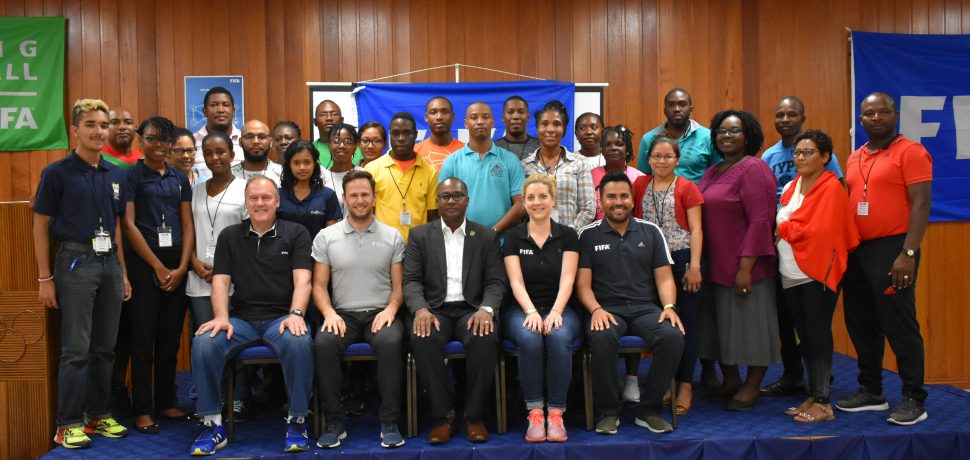The Guyana Football Federation (GFF) on Tuesday successfully concluded a two-day FIFA facilitated medicine workshop for physiotherapists and doctors attached to the GFF’s respective member associations.
The forum, which was staged in Guyana following a 23-year absence, was held at the Guyana Olympic Association’s conference facility and attracted 27 participants.
The sessions, which featured both theoretical and practical exercises, were administered by Head of FIFA Medical and Anti-Doping Department Alexis Weber, FIFA Medical Instructors Dr Andre Pedrinelli and Dr Jairo Cortes Rojas, and Group Leader of FIFA’s Medical Office, Anja König.
Among the areas that the workshop addressed were the role of the team doctor, medical bag, sideline gears, the role of the physiotherapist, minimum stadium requirements, injury prevention, pre-competition medical assessment, head injury and concussion, anti-doping regulations, and emergency medicine in football.
An overview of the FIFA Football Medicine Diploma, which participants were invited to enroll for, and a briefing about FIFA and its development programmes, was also done.
A press release from the GFF quoted its President Wayne Forde as saying, “We have a mandate as a fraternity to take care of our players, fans, officials and all other stakeholders who serve the game. It is the mandate of the GFF Executive Committee but, beyond the mandate, it is a moral responsibility of ours to ensure that those of you who are charged with the responsibility to ensure that we can respond appropriately to anyone who is injured or seems to be experiencing difficulty with their physiology during the conduct of the game or any other, is treated with the best and highest level of care we can deliver.”
Meanwhile, Quacy Paddy, physiotherapist attached to the Upper Demerara Football Association, stated, “I found this workshop very, very interesting. It opened my eyes to a lot of issues that are lacking in our football fraternity in Linden and areas that we need to strengthen and improve in. I also had a refresher on some conditions that would require medical attention both on and off the pitch. It also opened my horizon to the treatment protocol for concussion and sudden cardiac arrest. I learned about transporting patients on and off the field and how critical it is, and the importance of time on these cases.”
Similarly, Essequibo-Pomeroon Football Association’s Jason Boyce said, “This programme was very beneficial to me as a physiotherapist as I’ve never really viewed the content as presented by the facilitators. One of the most outstanding areas was the emphasis on prevention of injuries rather than treatment. They have given us advice on how to prepare for injuries as well as content on how we can prevent injuries. I plan to return to my Association, share the knowledge as well as mobilise players to develop themselves to prevent injuries from happening on and off the field. In terms of difference of approach following the workshop, I would be more careful before the matches rather than waiting to see what will happen in the match, that is, examine the players and see whether they are healthy enough to play the match in the first place, as an example.”





